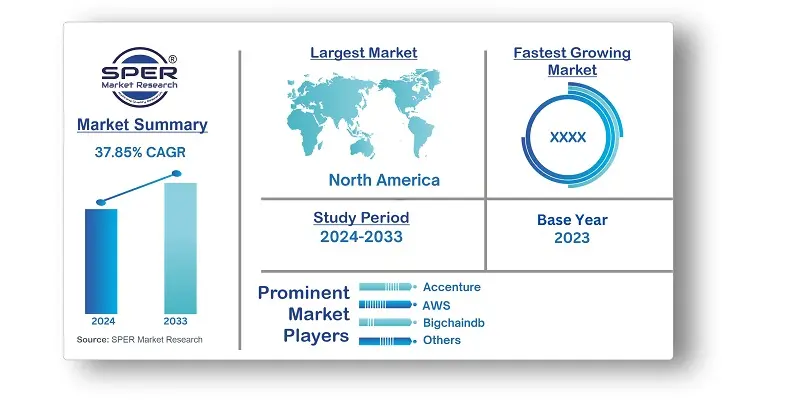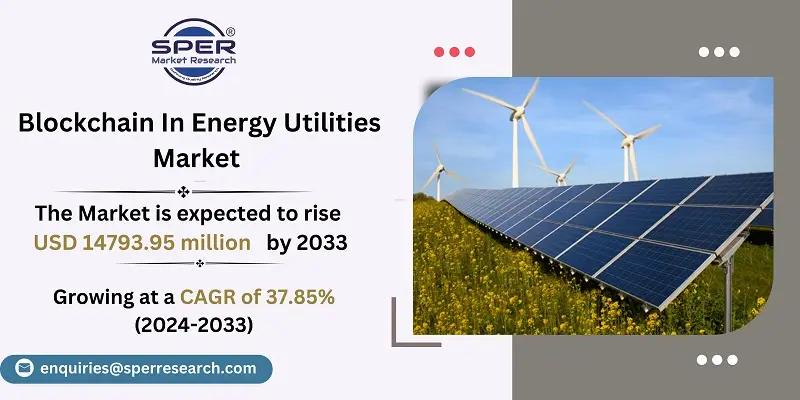
Blockchain In Energy Utilities Market Growth, Size, Trends, Share, Revenue and Future Outlook
Blockchain In Energy Utilities Market Size- By Type, By Component, By End User, By Application- Regional Outlook, Competitive Strategies and Segment Forecast to 2033
| Published: May-2024 | Report ID: POAE2438 | Pages: 1 - 215 | Formats*: |
| Category : Power & Energy | |||
- November 2020: Emarsys eMarketing Systems was purchased by SAP SE . With the integration of Emarsys and the capabilities of its current technologies, SAP Consumer Service will offer a framework for personalized omnichannel communication, engaging customers on their preferred platforms, at their convenience, and according to their terms.
- October 2020: Blue Acorn iCi was acquired by Infosys Limited. With this arrangement, Infosys will be able to provide a far better end-to-end client experience and demonstrates its continued commitment to helping customers with their digitalization journey. By combining consumer involvement, digital trading, analysis, and experience-driven commodities trading, Blue Acorn iCi will give Infosys vital cross-technology experience.


| Report Metric | Details |
| Market size available for years | 2020-2033 |
| Base year considered | 2023 |
| Forecast period | 2024-2033 |
| Segments covered | By Type, By Component, By Application, By End User |
| Regions covered | North America, Asia-Pacific, Latin America, Middle East & Africa and Europe |
| Companies Covered | Accenture, AWS, Bigchaindb,BTL, Deloitte,Grid+,IBM,Infosys,Microsoft,Nodalblock. |
- Utility Companies
- Energy Consumers and Prosumers (producers & consumers)
- Government regulators
- Technology companies
- Investors
| By Type: |
|
| By Component: |
|
| By End-user: |
|
| By Application: |
|
- Global Blockchain in energy utilities Market Size (FY’2024-FY’2033)
- Overview of Global Blockchain in energy utilities Market
- Segmentation of Global Blockchain in energy utilities Market By Type (Private, Public)
- Segmentation of Global Blockchain in energy utilities Market By Component (Platform, Services)
- Segmentation of Global Blockchain in energy utilities Market By Application (Grid Management, Energy Trading, Government Risk and Compliance,Management, Payment Schemes, Supply Chain Management, Others)
- Segmentation of Global Blockchain in energy utilities Market By End User (Power, Oil & gas)
- Statistical Snap of Global Blockchain in energy utilities Market
- Expansion Analysis of Global Blockchain in energy utilities Market
- Problems and Obstacles in Global Blockchain in energy utilities Market
- Competitive Landscape in the Global Blockchain in energy utilities Market
- Impact of COVID-19 and Demonetization on Global Blockchain in energy utilities Market
- Details on Current Investment in Global Blockchain in energy utilities Market
- Competitive Analysis of Global Blockchain in energy utilities Market
- Prominent Players in the Global Blockchain in energy utilities Market
- SWOT Analysis of Global Blockchain in energy utilities Market
- Global Blockchain in energy utilities Market Future Outlook and Projections (FY’2024-FY’2033)
- Recommendations from Analyst
1.1. Scope of the report1.2. Market segment analysis
2.1. Research data source2.1.1. Secondary Data2.1.2. Primary Data2.1.3. SPER’s internal database2.1.4. Premium insight from KOL’s2.2. Market size estimation2.2.1. Top-down and Bottom-up approach2.3. Data triangulation
4.1. Driver, Restraint, Opportunity and Challenges analysis4.1.1. Drivers4.1.2. Restraints4.1.3. Opportunities4.1.4. Challenges4.2. COVID-19 Impacts of the Global Blockchain In Energy Utilities Market.
5.1. SWOT Analysis5.1.1. Strengths5.1.2. Weaknesses5.1.3. Opportunities5.1.4. Threats5.2. PESTEL Analysis5.2.1. Political Landscape5.2.2. Economic Landscape5.2.3. Social Landscape5.2.4. Technological Landscape5.2.5. Environmental Landscape5.2.6. Legal Landscape5.3. PORTER’s Five Forces5.3.1. Bargaining power of suppliers5.3.2. Bargaining power of buyers5.3.3. Threat of Substitute5.3.4. Threat of new entrant5.3.5. Competitive rivalry5.4. Heat Map Analysis
6.1. Global Blockchain In Energy Utilities Market Manufacturing Base Distribution, Sales Area, Product Type6.2. Mergers & Acquisitions, Partnerships, Product Launch, and Collaboration in Global Blockchain In Energy Utilities Market
7.1. Global Blockchain In Energy Utilities Market Size, Share and Forecast, By Type, 2020-20267.2. Global Blockchain In Energy Utilities Market Size, Share and Forecast, By Type, 2027-20337.3. Private7.4. Public
8.1. Global Blockchain In Energy Utilities Market Size, Share and Forecast, By Component, 2020-20268.2. Global Blockchain In Energy Utilities Market Size, Share and Forecast, By Component, 2027-20338.3. Platform8.4. Services
9.1. Global Blockchain In Energy Utilities Market Size, Share and Forecast, By End-user, 2020-20269.2. Global Blockchain In Energy Utilities Market Size, Share and Forecast, By End-user, 2027-20339.3. Power9.4. Oil and Gas
10.1. Global Blockchain In Energy Utilities Market Size, Share and Forecast, By Application, 2020-202610.2. Global Blockchain In Energy Utilities Market Size, Share and Forecast, By Application, 2027-203310.3. Grid Management10.4. Energy Trading10.5. Government Risk and Compliance Management10.6. Payment Schemes10.7. Supply Chain Management10.8. Others
11.1. Global Blockchain in Energy Utilities Market Size and Market Share
12.1. Global Blockchain In Energy Utilities Market Size and Market Share By Region (2020-2026)12.2. Global Blockchain In Energy Utilities Market Size and Market Share By Region (2027-2033)12.3. Asia-Pacific12.3.1. Australia12.3.2. China12.3.3. India12.3.4. Japan12.3.5. South Korea12.3.6. Rest of Asia-Pacific12.4. Europe12.4.1. France12.4.2. Germany12.4.3. Italy12.4.4. Spain12.4.5. United Kingdom12.4.6. Rest of Europe12.5. Middle East and Africa12.5.1. Kingdom of Saudi Arabia12.5.2. United Arab Emirates12.5.3. Qatar12.5.4. South Africa12.5.5. Egypt12.5.6. Morocco12.5.7. Nigeria12.5.8. Rest of Middle-East and Africa12.6. North America12.6.1. Canada12.6.2. Mexico12.6.3. United States12.7. Latin America12.7.1. Argentina12.7.2. Brazil12.7.3. Rest of Latin America
13.1. ACCENTURE13.1.1. Company details13.1.2. Financial outlook13.1.3. Product summary13.1.4. Recent developments13.2. AWS.13.2.1. Company details13.2.2. Financial outlook13.2.3. Product summary13.2.4. Recent developments13.3. BIGCHAINDB13.3.1. Company details13.3.2. Financial outlook13.3.3. Product summary13.3.4. Recent developments13.4. BTL13.4.1. Company details13.4.2. Financial outlook13.4.3. Product summary13.4.4. Recent developments13.5. DELOITTE13.5.1. Company details13.5.2. Financial outlook13.5.3. Product summary13.5.4. Recent developments13.6. GRID+13.6.1. Company details13.6.2. Financial outlook13.6.3. Product summary13.6.4. Recent developments13.7. IBM13.7.1. Company details13.7.2. Financial outlook13.7.3. Product summary13.7.4. Recent developments13.8. INFOSYS13.8.1. Company details13.8.2. Financial outlook13.8.3. Product summary13.8.4. Recent developments13.9. MICROSOFT13.9.1. Company details13.9.2. Financial outlook13.9.3. Product summary13.9.4. Recent developments13.10. NODALBLOCK13.10.1. Company details13.10.2. Financial outlook13.10.3. Product summary13.10.4. Recent developments13.11. OTHERS
SPER Market Research’s methodology uses great emphasis on primary research to ensure that the market intelligence insights are up to date, reliable and accurate. Primary interviews are done with players involved in each phase of a supply chain to analyze the market forecasting. The secondary research method is used to help you fully understand how the future markets and the spending patterns look likes.
The report is based on in-depth qualitative and quantitative analysis of the Product Market. The quantitative analysis involves the application of various projection and sampling techniques. The qualitative analysis involves primary interviews, surveys, and vendor briefings. The data gathered as a result of these processes are validated through experts opinion. Our research methodology entails an ideal mixture of primary and secondary initiatives.



Frequently Asked Questions About This Report
PLACE AN ORDER
Year End Discount
Sample Report
Pre-Purchase Inquiry
NEED CUSTOMIZATION?
Request CustomizationCALL OR EMAIL US
100% Secure Payment






Related Reports
Our Global Clients
Our data-driven insights have influenced the strategy of 200+ reputed companies across the globe.




















